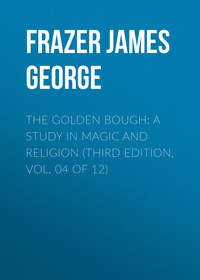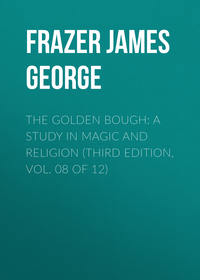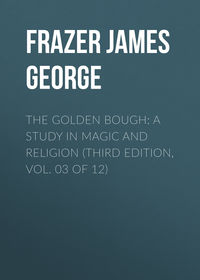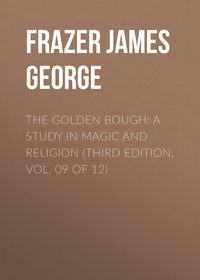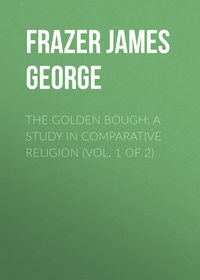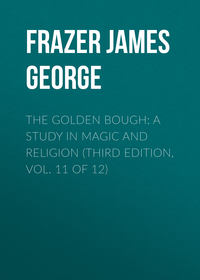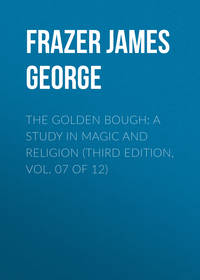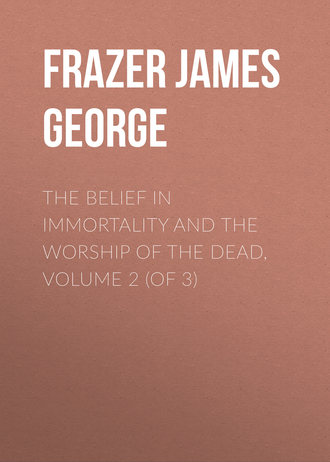 полная версия
полная версияThe Belief in Immortality and the Worship of the Dead, Volume 2 (of 3)
The custom of strangling the relations of a sick chief as a vicarious sacrifice to appease the anger of the deity and ensure the recovery of the patient was found in vogue by the first missionaries to Tonga before the arrival of Mariner. When King Moomōoe lay very sick and his death was hourly expected, one of his sons sent for a younger brother under pretence of wishing to cut off his little fingers as a sacrifice to save the life of their dying father. The young man came, whereupon his elder brother had him seized, strangled, and buried within a few yards of the house where the missionaries were living. Afterwards the fratricide came and mourned over his murdered brother by sitting on the grave with his elbows on his knees and covering his face with his hands. In this posture he remained for a long time in silence, and then departed very thoughtful. His motive for thus mourning over the brother whom he had done to death is not mentioned by the missionaries and was probably not known to them. We may conjecture that it was not so much remorse for his crime as fear of his brother's ghost, who otherwise might have haunted him.213 Morality, or at all events a semblance of it, has often been thus reinforced by superstitious terrors.
In recording this incident the missionaries make use of an expression which seems to set the strangling of human beings for the recovery of sick relations in a somewhat different light. They say that "the prince of darkness has impressed the idea on them, that the strength of the person strangled will be transferred into the sick, and recover him."214 On this theory the sacrifice acts, so to say, mechanically without the intervention of a deity; the life of the victim is transfused into the body of the patient as a sort of tonic which strengthens and revives him. Such a rite is therefore magical rather than religious; it depends for its efficacy on natural causes, and not on the pity and help of the gods. Yet the missionaries, who record this explanation of the custom, elsewhere implicitly accept the religious interpretation of such rites as vicarious sacrifices; for they say that among the superstitious notions of the natives concerning spirits was one that "by strangling some relations of the chief when he is sick, the deity will be appeased, and he (that is, the sick chief) will recover."215 Perhaps both explanations, the religious and the magical, were assigned by the Tongans: consistency of thought is as little characteristic of savage as of civilised man: provided he attains his ends, he recks little of the road by which he reaches them. An English sailor named Ambler, who had resided for thirteen months in Tonga before the arrival of the missionaries, told them, "that when a great chief lay sick they often strangled their women, to the number of three or four at a time."216 Such a sacrifice is more likely to have been religious than magical; we may suppose that the victims were rather offered to the gods as substitutes for the chief than killed to recruit his failing strength by an infusion of their health and vigour. A chief would probably have disdained the idea of drawing fresh energy from the bodies of women, though he might be ready enough to believe that the gods would consent to accept their life as a proxy for his own. It is true that elsewhere, notably in Uganda, human beings have been killed to prolong the life of the king by directly transferring their strength to him;217 but in such cases it would seem that the victims have invariably been men and not women.
§ 8. The Doctrine of the Soul and its Destiny after Death
Thus far we have dealt with the primary or superior gods, who were believed to have been always gods, and about whose origin nothing was known. We now pass to a consideration of the secondary or inferior gods, whose origin was perfectly well known, since they were all of them the souls of dead chiefs or nobles, of whom some had died or been killed in recent years. But before we take up the subject of their worship, it will be well to say a few words on the Tongan doctrine of the human soul, since these secondary deities were avowedly neither more nor less than human souls raised to a higher power by death.
The Tongans, in their native state, before the advent of Europeans, did not conceive of the soul as a purely immaterial essence, that being a conception too refined for the thought of a savage. They imagined it to be the finer or more aeriform part of the body which leaves it suddenly at the moment of death, and which may be thought to stand in the same relation to the body as the perfume of a flower to its solid substance. They had no proper word to express this fine ethereal part of man; for the word loto, though it might sometimes be used for that purpose, yet rather means a man's disposition, inclination, passion, or sentiment. The soul was supposed to exist throughout the whole of the body, but to be particularly present in the heart, the pulsation of which they regarded as the strength and power of the soul. They did not clearly distinguish between the life and the soul, but said that the right auricle of the heart was the seat of life. They took the liver to be the seat of courage, and professed to have remarked, on opening dead bodies, that the largest livers belonged to the bravest men, in which observation they were careful to make allowance for the enlargement of livers consequent on disease.218
They acknowledged that the tooas or lower order of people had minds or souls; but they firmly believed that these vulgar souls died with their bodies and consequently had no future existence. In this aristocratic opinion the generality of the commoners acquiesced, though some were vain enough to think that they had souls like their betters, and that they would live hereafter in Bolotoo. But the orthodox Tongan doctrine restricted immortality to chiefs and their ministers (the matabooles); at most, by a stretch of charity, it extended the privilege to the mooas or third estate; but it held out no hope of salvation to tooas, who formed the fourth and lowest rank of society.219
Mariner's account, which I have followed, of the sharp distinction which the Tongans drew between the immortality of chiefs and the mortality of common people is confirmed by the testimony of other and independent observers. According to Captain Cook, while the souls of the chiefs went immediately after death to the island of Boolootoo (Bolotoo), the souls of the lower sort of people underwent a sort of transmigration or were eaten by a bird called loata, which walked upon their graves for that purpose.220 The first missionaries, who landed in Tongataboo in 1797, report that the natives "believe the immortality of the soul, which at death, they say, is immediately conveyed in a very large fast-sailing canoe to a distant country called Doobludha, which they describe as resembling the Mahometan paradise. They call the god of this region of pleasure Higgolayo, and esteem him as the greatest and most powerful of all others, the rest being no better than servants to him. This doctrine, however, is wholly confined to the chiefs, for the tooas (or lower order) can give no account whatever; as they reckon the enjoyments of Doobludha above their capacity, so they seem never to think of what may become of them after they have served the purposes of this life."221 One of these first missionaries was a certain George Veeson, who had been a bricklayer before he undertook to convert the heathen to Christianity. Wearying, however, of missionary work, he deserted his brethren and betook himself to the heathen, among whom he lived as one of them, adopting the native garb, marrying native women, and eagerly fighting in the wars of the natives among themselves. In this way he acquired a considerable knowledge of the Tongan language and customs, of which he made some use in the account of his experiences which he published anonymously after his return to England. Speaking of Tongan ideas concerning the immortality of the soul he says that he heard the chiefs speak much of Bulotu (Bolotoo). "Into this region, however, they believed none were admitted but themselves. The Tuas, or lower class, having no hope of sharing such bliss, seldom speculate upon a futurity, which to them appears a subject lost in shadows, clouds, and darkness."222 The missionaries reported to Commodore Wilkes that the spirits of all chiefs were supposed to go to Bolotoo, while the souls of poor people remained in this world to feed upon ants and lizards.223 With regard to the fate of the soul after death, the Tongans universally and positively believed in the existence of a great island, lying at a considerable distance to the north-west, which they considered to be the abode of their gods and of the souls of their dead nobles and their ministers (the matabooles). This island they supposed to be much larger than all their own islands put together, and to be well stocked with all kinds of useful and ornamental plants, always in a high state of perfection, and always bearing the richest fruits and the most beautiful flowers according to their respective natures; they thought that when these fruits or flowers were plucked, others immediately took their place, and that the whole atmosphere was filled with the most delightful fragrance that the imagination can conceive, exhaled from these immortal plants. The island, too, was well stocked with the most beautiful birds, of all imaginable kinds, as well as with abundance of hogs; and all of these creatures were immortal, except when they were killed to provide food for the gods. But the moment a hog or a bird was killed, another live hog or bird came into existence to supply its place, just as happened with the fruits and flowers; and this, so far as they could ascertain, was the only way in which plants and animals were propagated in Bolotoo. So far away was the happy island supposed to be that it was dangerous for living men to attempt to sail thither in their canoes; indeed, except by the express permission of the gods, they could not find the island, however near they might come to it. They tell, however, of a Tongan canoe which, returning from Fiji, was driven by stress of weather to Bolotoo. The crew knew not the place, and being in want of provisions and seeing the country to abound in all sorts of fruits, they landed and proceeded to pluck some bread-fruit. But to their unspeakable astonishment they could no more lay hold of the fruit than if it were a shadow; they walked through the trunks of the trees and passed through the substance of the houses without feeling any shock or resistance. At length they saw some of the gods, who passed through the men's bodies as if they were empty space. These gods recommended them to go away immediately, as they had no proper food for them, and they promised them a fair wind and a speedy passage. So the men put to sea, and sailing with the utmost speed they arrived at Samoa, where they stayed two or three days. Thence, again sailing very fast, they returned to Tonga, where in the course of a few days they all died, not as a punishment for having been at Bolotoo, but as a natural consequence, the air of that place, as it were, infecting mortal bodies with speedy death. The gods who dwell in Bolotoo have no canoes, not requiring them; for if they wish to be anywhere, there they are the moment the wish is felt.224
It is said that in order to people Bolotoo the god Hikuleo used to carry off the first-born sons of chiefs and other great men, whom he transported to the island of the gods. To such lengths did he go in this system of abduction that men on earth grew very uneasy. Their ranks became thinner and thinner. How was all this to end? At last the other gods were moved to compassion. The two gods Tangaloa and Maui laid hold of brother Hikuleo, passed a strong chain round his waist and between his legs, and then taking the chain by the ends they fastened one of them to the sky and the other to the earth. Thus trussed up, the deity still made many attempts to snatch away first-born sons; but all his efforts were thwarted and baffled by the chain, for no sooner did he dart out in one direction, than the chain pulled him back in another. According to another, or the same story, the excursions of the deity were further limited by the length of his tail, the end of which was tethered to the cave in which he resided; and though the tail was long and allowed him a good deal of rope, do what he would, he could not break bounds or obtain more than a very partial view of what was going on in the rest of the world.225
In this curious story we may perhaps detect a tradition of a time when among the Tongans, as among the Semites, religion or superstition demanded the sacrifice of all first-born sons, a barbarous custom which has been practised by not a few peoples in various parts of the earth.226
The human soul after its separation from the body at death was termed a hotooa or atua, that is, a god or spirit, and was believed to exist in the shape of the body and to have the same propensities as in life, but to be corrected by a more enlightened understanding, by which it readily distinguished good from evil, truth from falsehood, and right from wrong. The souls dwelt for ever in the happy regions of Bolotoo, where they bore the same names as in life and held the same rank among themselves as they had held during their mortal existence. But their lot in Bolotoo was in no way affected by the good or evil which they had done on earth; for the Tongans did not believe in a future state of retribution for deeds done in the body; they thought that the gods punished crime in this present world, without waiting to redress the balance of justice in the world to come. As many of the nobles who passed at death to Bolotoo had been warlike and turbulent in their life, it might naturally be anticipated that they should continue to wage war on each other in the land beyond the grave; but that was not so, for by a merciful dispensation their understandings were so much enlightened, or their tempers so much improved, by their residence in Bolotoo, that any differences they might have between themselves, or with the primitive gods, they adjusted by temperate discussion without resort to violence; though people in Tonga sometimes heard an echo and caught a glimpse of these high debates in the rumble of thunder and the flash of lightning.227 In the blissful abode of Bolotoo the souls of chiefs and nobles lived for ever, being not subject to a second death, and there they feasted upon all the favourite productions of their native country, which grew also abundantly in the happy island.228
A less cheerful picture, however, of the state of souls in the other world was painted for Commodore Wilkes by the missionaries who furnished him with information on the native religion of the Tongans. According to them, the souls were forced to become the servants, or rather slaves, of the long-tailed deity Hikuleo, whose commands they had no choice but to execute. His house and all things in it were even constructed of the souls of the dead; and he went so far as to make fences out of them and bars to his gates, an indignity which must have been deeply resented by the proud spirits of kings and nobles.229 How this gloomy picture of the fate of souls in Bolotoo is to be reconciled with the bright descriptions of it which I have drawn from the pages of Mariner and Cook, it is not easy to say. Apparently we must acquiesce in the discrepancy. That savages should entertain inconsistent views on the life after death need not surprise us, when we remember how little accurate information even civilised peoples possess on that momentous subject.
§ 9. The Souls of the Dead as Gods
We have seen that according to Mariner, our best authority on Tongan religion, the souls of dead nobles ranked as gods, possessing all the powers and attributes of the primary or original deities, though in an inferior degree.230 Thus, like the primary gods, they had the power of returning to Tonga to inspire priests, relations, or other people.231 For example, the son of Finow, the King, used to be inspired by the spirit of Toogoo Ahoo, a former king of Tonga, who had been assassinated with the connivance of his successor, Finow. One day Mariner asked this young chief how he felt when he was visited by the spirit of the murdered monarch. The chief replied that he could not well describe his feelings, but the best he could say of it was, that he felt himself all over in a glow of heat and quite restless and uncomfortable; he did not feel his personal identity, as it were, but seemed to have a mind differing from his own natural mind, his thoughts wandering upon strange and unusual topics, though he remained perfectly sensible of surrounding objects. When Mariner asked him how he knew it was the spirit of Toogoo Ahoo who possessed him, the chief answered impatiently, "There's a fool! How can I tell you how I knew it? I felt and knew it was so by a kind of consciousness; my mind told me that it was Toogoo Ahoo." Similarly Finow himself, the father of this young man, used occasionally to be inspired by the ghost of Moomooi, a former king of Tonga.232
Again, the souls of dead nobles, like gods, had the power of appearing in dreams and visions to their relatives and others to admonish and warn them. It was thought, for example, that Finow the king was occasionally visited by a deceased son of his; the ghost did not appear, but announced his presence by whistling. Mariner once heard this whistling when he was with the king and some chiefs in a house at night; it was dark, and the sound appeared to come from the loft of the house. In Mariner's opinion the sound was produced by some trick of Finow's, but the natives believed it to be the voice of a spirit.233 Once more, when Finow the king was himself dead, a noble lady who mourned his death and generally slept on his grave, communicated to his widow a dream which she had dreamed several nights at the graveyard. She said that in her dream the late king appeared to her, and, with a countenance full of sorrow, asked why there yet remained so many evil-designing persons in the islands; for he declared that, since he had been at Bolotoo, he had been disturbed by the plots of wicked men conspiring against his son; therefore was he come to warn her of the danger. Finally, he bade her set in order the pebbles on his grave, and pay every attention to his burial-ground. With that he vanished.234 In such dreams of the reappearance of the recent dead we may discover one source of the belief in the survival of the soul after death.
But the gods appeared to mankind to warn, comfort, and advise, not only in their own divine form but also in the form of animals. Thus the primitive gods, according to Mariner, sometimes entered into the living bodies of lizards, porpoises, and a species of water snake. Hence these creatures were much respected. The reason why gods entered into porpoises was to take care of canoes. This power of assuming the form of living animals, says Mariner, belonged only to the original gods, and not to the deified souls of chiefs.235 In thus denying that the spirits of the dead were supposed sometimes to revisit the earth in animal shapes Mariner was perhaps mistaken, for a different view on the subject was apparently taken at a later time by Miss Farmer, who had access to good sources of information. She writes as follows: "Bulotu (Bolotoo) was peopled with the spirits of departed chiefs and great persons of both sexes; and it was to these chiefly that worship was paid and that sacrifices were offered. These spirits in Bulotu were supposed to act as intercessors with the supreme gods, who were too highly exalted to be approached by men except in this way. The spirits were in the habit of revisiting earth. They would come in birds, or in fish as their shrines. The tropic-bird, king-fisher, and sea-gull, the sea-eel, shark, whale, and many other animals were considered sacred, because they were favourite shrines of these spirit-gods. The heathen never killed any of these creatures; and if, in sailing, they chanced to find themselves in the neighbourhood of a whale, they would offer scented oil or kava to him. To some among the natives the cuttle-fish and the lizard were gods; while others would lay offerings at the foot of certain trees, with the idea of their being inhabited by spirits. A rainbow or a shooting star would also command worship."236
This account seems to imply that the spirits which took the form of these animals, birds, and fish were believed to be the souls of the dead returning from the spirit world to revisit their old homes on earth. But even if we suppose that herein the writer was mistaken, and that, as Mariner affirmed, only the original and superior gods were deemed capable of incarnation in animal shape, the account is still valuable and interesting because it calls attention to a side of Tongan religion on which our principal authority, Mariner, is almost silent. That side comprises the worship of natural objects, and especially of animals, birds, and fish, regarded as embodiments of spirits, whether gods or ghosts. This worship of nature, and particularly of animated nature, was highly developed among the Samoans; it would be natural, therefore, to find the same system in vogue among their neighbours and near kinsmen the Tongans, though our authorities on Tongan religion say little about it. The system may with some appearance of probability be regarded as a relic of a former practice of totemism.237
In recent years a considerable amount of evidence bearing on the subject has been collected by Mr. E. E. V. Collocot. He distinguishes the national Tongan gods from the gods of tribes, clans, and small groups of allied households; such a group of households, it appears, formed the ordinary social unit. Indeed, he tells us that there was nothing to prevent a man from setting up a tutelary deity of his own, if he were so disposed; he might adopt almost any object for the religious reverence of his household and himself. Thus there was "a gradation in the divine hierarchy from gods of populous tribes down to deities the private possession of a very few."238 Further, Mr. Collocot found that most of the gods had sacred animals or other natural objects associated with them,239 and that the worshippers were generally forbidden to eat the sacred animals of their gods. He concludes that "in the period of which we have information totemism has given way to a more highly developed polytheism, but there are indications that the development was by way of totemism."240 Among the facts which appear to support this conclusion we may note the following.
There was a great god called Boolotoo Katoa, that is, "the whole of Boolotoo (Bolotoo)," who had the dog for his sacred animal; while the deity was being worshipped, a dog lay at the side of the priest. This god had his principal shrine at Boha in the eastern part of Tongataboo: the district was of old the centre of government and the residence of the Tooitonga.241 Another god, whose name was the King of the tribe or clan of Fonua (Tui-Haafakafonua), had for his sacred animal a lizard, and for the convenience of his departure, and presumably arrival, a tree or post was always provided for him to crawl along. A handy post or tree-stump was a regular part of his temple furnishings.242 Another god, whose name signifies "Proud Boastfulness of the Season" (Mofuta-ae-ta'u), had for his sacred animal a great sea-eel, which dwelt in an opening of the reef opposite the village. This deity used to take it very ill if anybody appeared on the beach near his abode wearing a turban or whitened with lime; and should a man rashly disregard the feelings of the divine eel in these respects, it was believed that the deity would carry him off to his hole in the rock.243 Another god, named Haele-feke, used to manifest himself in the form of an octopus (feke). Whenever an octopus appeared in a certain pool, it was at once recognised as the god, and the priestess immediately went and awaited him at the shrine, which seems to have been a small raised platform. Thither the people presently resorted, bringing bunches of coco-nuts and coco-nut leaves and earth. The priestess thereupon spoke as in the person of the octopus, and apparently imitated the creature, presumably by sprawling in the ungainly manner of an octopus. The worshippers of this deity abstained from eating the flesh of the octopus, and even from approaching a place where other people were eating it. If any of them transgressed the taboo, he was afflicted with complete baldness. Should any of the worshippers find a dead octopus, they buried it with all due ceremony in Teekiu, their principal village.244 The rail bird (kalae) was worshipped by some people, who used to tie bunches of the birds together and carry them about with them when they travelled; and the priest had a bunch of the sacred birds tattooed as a badge on his throat.245 The clan Fainga'a had for its sacred animal the mullet; and it is said that young mullets were tabooed to the men of the clan.246 A family group in Haapai had the owl for their sacred creature; if an owl hooted near a house in the afternoon, it was a sign that there was a pregnant woman in the household.247 The god of Uiha in Haapai was the Eel-in-the-Open-Sea (Toke-i-Moana); as usual, the worshippers might not eat the flesh of eels or approach a place where an eel was being cooked.248 The clan Falefa worshipped two goddesses, Jiji and Fainga'a, whose sacred creature was the heron. Jiji was supposed to be incarnate in the dark-coloured heron, and Fainga'a in the light-coloured heron. When a pair of herons, one dark and the other light-coloured, were seen flying together, people said that it was the two goddesses Jiji and Fainga'a.249 In the island of Tofua there was a clan called the King of Tofua (Tui Tofua), which had the shark for its god; members of the clan might not eat the flesh of sharks, because they believed themselves to be related to the fish; they said that long ago some of the clansmen leaped from a canoe into the sea and were turned into sharks.250 Another god who appeared in the form of a shark was Taufa of the Sea (Taufa-tahi); but in another aspect he was a god of the land (Taufa-uta) and a notable protector of gardens. To secure his aid the husbandman had only to plait a coco-nut leaf in the likeness of a shark and to hang it up in his plantation; a garden thus protected was under a taboo which no one would dare to violate. A Christian, who ventured to thrust his hand in mockery into the maw of the sham shark, had both his arms afterwards bitten off by a real shark.251 Other gods were recognised in the shape of flying-foxes, shell-fish, and little blue and green lizards.252 We hear of two Tongan gods who had black volcanic pebbles for their sacred objects,253 and of one whose shrine was the tree called fehi, the hard wood of which was commonly used for making spears and canoes.254 The gods of Niua Fo'ou, one of the most distant islands of the Tongan group, were three in number, to wit, the octopus, pig's liver, and a large lump of coral. The worshippers of the two former deities might not eat the divine octopus and the divine pig's liver.255 Christianity itself appears not to have wholly extinguished the reverence of the natives for the sacred animals of their clans. A much-respected native minister of the Methodist Church informed Mr. Collocot that to this day he gets a headache if he eats the sacred animal of his clan, though other people may partake of the creature, not only with impunity, but with relish.256


